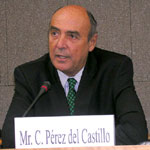On Friday, the WTO TRIPS council will apparently meet again to try to agree upon a permanent amendment to the TRIPS agreement, in theory to make it easier to export medicines manufactured under a compulsory license. There is a lot of drama over this negotiation, and it illustrates the way a WTO negotiation can turn the whole notion of free trade upside down, how it can promote protectionism, and how firmly the big drug companies are in control of the US and EU negotiators, and how closely they work with WTO DG Pascal Lamy,

the former top EC trade official.
In 2001, the WTO adapted a very good declaration on TRIPS and public health. This declaration has seven sections (referred to somewhat inaccurately as paragraphs), which among other things, says that WTO members should implement the TRIPS obligations in “a manner that promotes access to medicines for all.” Ever since then, big pharmaceutical companies have tried to undermine if not overturn this declaration. The main vehicle for this mischief has been the one paragraph (para 6), which promised a “solution” to one of the obvious flaws of the TRIPS agreement -- the restrictions on exports of products manufactured under a compulsory license.
The source of this problem, Article 31.f of the TRIPS, limits exports to less than half of production. This is a big problem for countries with small domestic markets, because they just won’t have the economies of scale for efficient production if they can’t export. It is also a problem for big countries, even the United States, if they lack the capacity to manufacture a product -- such as the case today for Tamiflu, the drug for treatment of avian flu, because countries big or small will not be able to find foreign suppliers of needed generic medicines.
Trade officials in the US and the EC understand perfectly well that if they make the system of compulsory licensing of medicines inefficient enough, it won’t be used much. So they focused on the
para 6 implementation with the intention of making it work poorly. They also decided they could use this negotiation to introduce all sorts of new precedents within the TRIPS, that never existed before, such as WTO oversight and reporting for each compulsory license, new procedures for issuing licenses that make it more risky and burdensome for generic suppliers, and creating new opportunities to trigger bilateral pressure on countries to prevent them from actually using compulsory licenses.
They also tried in 2002 and 2003, unsuccessfully, to restrict the diseases that would be covered by the agreement, seeking to undermine the broader nature of the 2001 agreement.
When head of DG-Trade, Pascal Lamy was the main architect of this strategy for the EC.
Policy in the US was dictated at the highest levels of the White House, out


of the office of Karl Rove, in close consultation with big pharma companies, and particularly Pfizer CEO Hank McKinnnell, who helps raise a lot of money for Rove’s various political projects.
On 30 August 2003, a "temporary" solution to para 6 of the Doha Declaration on TRIPS and Public Health was announced. It was a very complex and limited set of procedures for overcoming the 31.f restriction, which actually made consumers everywhere worse off, because it not only created new precedent for burdensome procedures, but it had the practical effect of making two other possible legal mechanisms for authorizing exports less feasible, on political if not legal grounds. It was
widely criticized by virtually all public health, consumer and development NGOs following the negotiations.
Worse than the text of the 30 August 2003 decision

was a long
Chairman's Statement which gave a restrictive interpretation of the agreement, and further narrowed the utility of the 30 August 2003 decision. The "Chairman's statement, which was read at the WTO by General Council chairperson Carlos Pérez del Castillo, Uruguay’s ambassador to the WTO, was approved by Pfizer CEO McKinnell and Karl Rove's office.
(In 2005, Castillo
ran for the position of DG of the WTO, but was defeated by Lamy, who now holds the post).
The negotiations over para 6 of the Doha Declaration on TRIPS and Public Health were widely considered a disaster by the public health community, and also by many developing country delegates. The US and EC obtained the deal by relentlessly focusing on the African negotiators, and pressuring them to keep the Asian and Latin American countries from having any meaningful role in the final negotiations. Enormous pressure was applied to African countries, and in the end, they agreed to a package that was not only complicated and restrictive, but also highly protectionist -- by design.
The African countries were promised they could use the agreement to keep the Asian and Latin American producers out of the African market, which would have been more relevant if the African generic producers actually had the capacity to efficiently manufacture the active pharmaceutical ingredients (APIs) that were key to the manufacturing of medicines. The US and the Europeans were also given the right to "opt-out" of the agreement as importing countries, so they could favor domestic producers even in cases where they issued a compulsory license. So much for free trade.
Despite its twisted outcome, the WTO trumpeted the 2003 deal as a great gift to the poor, partly to mask the paucity of progress on development issues, such as agricultural subsidies.
Now a little more than two years later, with the Hong Kong Ministerial having made no visible progress on real development issues, Lamy, the EC and the US are again pushing hard on the same issue -- this time to make the temporary waiver of 31.f permanent. At the same time, they are seeking to elevate the legal status of the 2003 Chairman’s Text -- actually making consumers worse off.
There are many aspects of this, and here are just a few. The Africa Group made a very good proposal in February 2005 for a much better permanent amendment. It was opposed by the US and the EC. The EC and then the US then focused once more on the African negotiators, and apparently succeeded in completely taking off-the-table the highly regarded February proposal, and replacing it with something that would simply make the 2003 agreement permanent. The US and the EC are also pushing to elevate the legal status of the 2002 Chairman’s Statement, which would make generic producers and consumers worse off.
There is little information about what is going on in terms of the trade-offs, but it is clear that the US and the EC have decided they can use the African negotiators to undermine the positions advocated by Asian and Latin American negotiators.
Bird Flu debateMeanwhile, the global debate over access to medicines for a possible avian flu pandemic have raised awarness of some of the more obvious reasons a country would not want to "opt-out" as a possible importer of this mechanism.
The 30 August 2003 decision lists some 23 countries that say they will opt-out of the mechanism, even in cases of a public health emergency or pandemic. The Chairman's statement expanded that list, to now include:
Australia, Austria, Belgium, Canada, Czech Republic, Cyprus, Denmark, Estonia, Finland, France, Germany, Greece, Hungary, Iceland, Ireland, Italy, Japan, Latvia, Lithuania, Luxembourg, Malta, Netherlands, New Zealand, Norway, Poland, Portugal, Slovak Republic, Slovenia, Spain, Sweden, Switzerland, United Kingdom and United States of America.
None of these countries can currently obtain enough generic versions of Tamiflu to fill national stockpiles, and only a couple could actually manufacture the vaccines they would want should a pandemic break out. There has been no press coverage of this at all in the mainstream US press, and
almost nothing in Europe either.
(I have written about this on two occasions in the Huffington Post (
1,
2).
Meanwhile, the US and the EC both refuse to meet with public health groups to discuss the obvious risk to public health of opting out of the decision, and they are rushing to make this opt-out permanent before the December Hong Kong WTO meeting.
Earlier this week the US, the EC and the WTO DG Lamy were able to announce a new deal on a related TRIPS issues -- the requested extension for Least Developed Countries to comply with TRIPS. In 2004 these countries had an
average per capita income of less than $1 per day. The LDCs wanted a 15-year extension. They got half that, but with several strings, including a requirement for extra cooperation beginning in 2008 to implement the TRIPS agreement, and most important, a pledge that there will be no “backtracking” for countries that have already implemented the TRIPS obligations -- which most have. This too was presented as gift to the poor.
James Packard Love
December 1, 2005
 the former top EC trade official.
the former top EC trade official.
 of the office of Karl Rove, in close consultation with big pharma companies, and particularly Pfizer CEO Hank McKinnnell, who helps raise a lot of money for Rove’s various political projects.
of the office of Karl Rove, in close consultation with big pharma companies, and particularly Pfizer CEO Hank McKinnnell, who helps raise a lot of money for Rove’s various political projects. 
